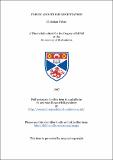Files in this item
FORUM and its implementation
Item metadata
| dc.contributor.advisor | Dyckhoff, Roy | |
| dc.contributor.author | Urban, Christian | |
| dc.coverage.spatial | 132 p. | en_US |
| dc.date.accessioned | 2018-05-22T10:10:54Z | |
| dc.date.available | 2018-05-22T10:10:54Z | |
| dc.date.issued | 1997 | |
| dc.identifier.uri | https://hdl.handle.net/10023/13443 | |
| dc.description.abstract | Miller presented Forum as a specification logic: Forum extends several existing logic programming languages, for example Prolog, LO and Lolli. The crucial change in Forum is the extension from single succedent sequents, as in intuitionistic logic, to multiple succedent sequents, as in classical logic, with a corresponding extension of the notion of uniform proof. Forum uses the connectives of linear logic. Languages based on linear logic offer extra expressivity (in comparison with traditional logic languages), but also present new implementation challenges. One such challenge is that of context management, because the multiplicative linear connectives 'R', ''S'' and '-o' require context splitting. Hodas and Miller presented a solution (the 10 model) to this in 1991 for the language Lolli based on minimal linear logic. This thesis presents a technique which is an adaptation of the aforementioned approach for the language Forum and following a suggestion of Miller that the '.' constant be treated as primitive in order to avoid looping problems arising from its use as a derived symbol. Cervesato, Hodas and Pfenning have presented a technique for managing the 'T' constant, dividing each input context into a "slack" part and a "strict" part; the main novel contribution of this thesis is to modify this technique, by dividing instead the output context. This leads to a proof system with fewer rules (and consequent ease of implementation) but enhanced performance, for which we present some experimental evidence. | en_US |
| dc.language.iso | en | en_US |
| dc.publisher | University of St Andrews | en_US |
| dc.subject.lcc | QA76.73F7U8 | |
| dc.subject.lcsh | Programming languages (Electronic Computers). | en |
| dc.title | FORUM and its implementation | en_US |
| dc.type | Thesis | en_US |
| dc.contributor.sponsor | Chamber of Commerce (Germany) | en_US |
| dc.contributor.sponsor | Dresden University | en_US |
| dc.contributor.sponsor | University of St Andrews | en_US |
| dc.contributor.sponsor | European Strategic Programme of Research and Development in Information Technology | en_US |
| dc.type.qualificationlevel | Doctoral | en_US |
| dc.type.qualificationname | MPhil Master of Philosophy | en_US |
| dc.publisher.institution | The University of St Andrews | en_US |
This item appears in the following Collection(s)
Items in the St Andrews Research Repository are protected by copyright, with all rights reserved, unless otherwise indicated.

